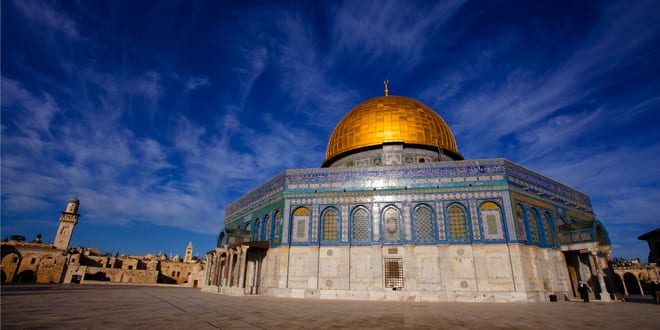Mohammad Tawhidi, known as the Imama of Peace, responded to an Instagram post on an account named “the Holy Shrine of Imam Hussain” claiming the Temple Mount in Jerusalem has holy significance to Islam.
The Instagram account of the Holy Shrine of Imam Hussain (a.s) is once again spreading lies,” Tawhidi tweeted on Monday. “There’s no “بيت المقدس” “Mosque of Bayt al Maqdis” in Islam. This is stolen from the Jewish term “Beit Mikdash” بيت مكداش which refers to the Jewish Structure by Prophet David.”
“Secondly, Al-Aqsa Mosque in Jerusalem today is not the one referred to in the Quran. It was built by the caliphs in later years. Imam Baqir (a.s) was opposed to the caliphs, so how can he order the Shia to go and pray there? The Shrines should stick to religion & leave politics.”
Secondly, Al-Aqsa Mosque in Jerusalem today is not the one referred to in the Quran. It was built by the caliphs in later years. Imam Baqir (a.s) was opposed to the caliphs, so how can he order the Shia to go and pray there? The Shrines should stick to religion & leave politics.
— Imam of Peace (@Imamofpeace) August 2, 2020
Tawhidi has made this claim in the past. In June 2019, he posted to Facebook about the inconsistencies in Hamas’ claim to the Temple Mount.
“It’s called ‘Temple Mount’, but it belongs to us Muslims even though there are no Temples in Islam,” Tawhidi wrote. “Hamas logic going really well I see.”
Tawhidi is a Shi’ite Muslim of Iraqi origin who was born in Qom, Iran. Tawhidi believes that Islam must be reformed in order to survive. He deems all acts of terrorism to be condemned in the Quran. Tawhidi also opposes Muslims justifying domestic violence, polygamy, and the killing of apostates. In 2019 he was the first Shia Imam to “pay respects at Auschwitz” concentration camp. Tawhidi has been targeted by death threats from Islamist groups.
Dr. Mordechai Kedar, a senior lecturer at Bar Ilan University, agrees with Tawhidi, referring to Muslims’ claims to the Temple Mount as “fake news.” He explained the historical fallacy that surrounds this claim in an article published in Arutz Sheva.
Early Islamic sources state that the “al Aqsa Mosque” (literal meaning: ‘the farther mosque’), mentioned only once in the Koran, was one of two mosques located near Ji’irrana, a village located between Mecca and Taaf in the Arabian Peninsula (now Saudi Arabia.) One of the mosques was called “al-Masjid al-Adna,” meaning the “closer mosque” and the other ” al-Masjid al-Aqsa”, the “farther mosque.” When the Koran refers to the al Aqsa mosque while telling the myth of the Prophet Muhammad’s night time journey from the “holy mosque” of Mecca to al Aqsa, that is, the “farther mosque,” it is referring to the mosque in Ji’irrana.
In 682 C.E., fifty years after Mohammed’s death, Abd allah Ibn al-Zubayr, the tough man of Mecca, rebelled against the Umayyads who ruled Damascus and would not allow them to fulfill the Haj in Mecca. Since the Haj pilgrimage is one of the five basic Islamic commandments, they were forced to choose Jerusalem as their alternative for a pilgrimage site. In order to justify choosing Jerusalem, the Umayyads rewrote the story told in the Koran, moving the al Aqsa mosque to Jerusalem, and adding, for good measure, the myth of the night time journey of Mohammed to al Aqsa. This is the reason the Sunnis now consider Jerusalem their third holiest city.
Shia Islam, mercilessly persecuted by the Umayya Caliphate, did not accept the holy Jerusalem canard, which is the reason the second holiest city to Shiites is Najif in Iraq, the burial place of Shiite founder Ali bin Abi Talib. Many of the Shiite elders – Iranian and Hezbollah – only began to call Jerusalem holy after the Khomeni rebellion in 1979 so as to keep the Sunnis from accusing them of being soft on Zionism.




